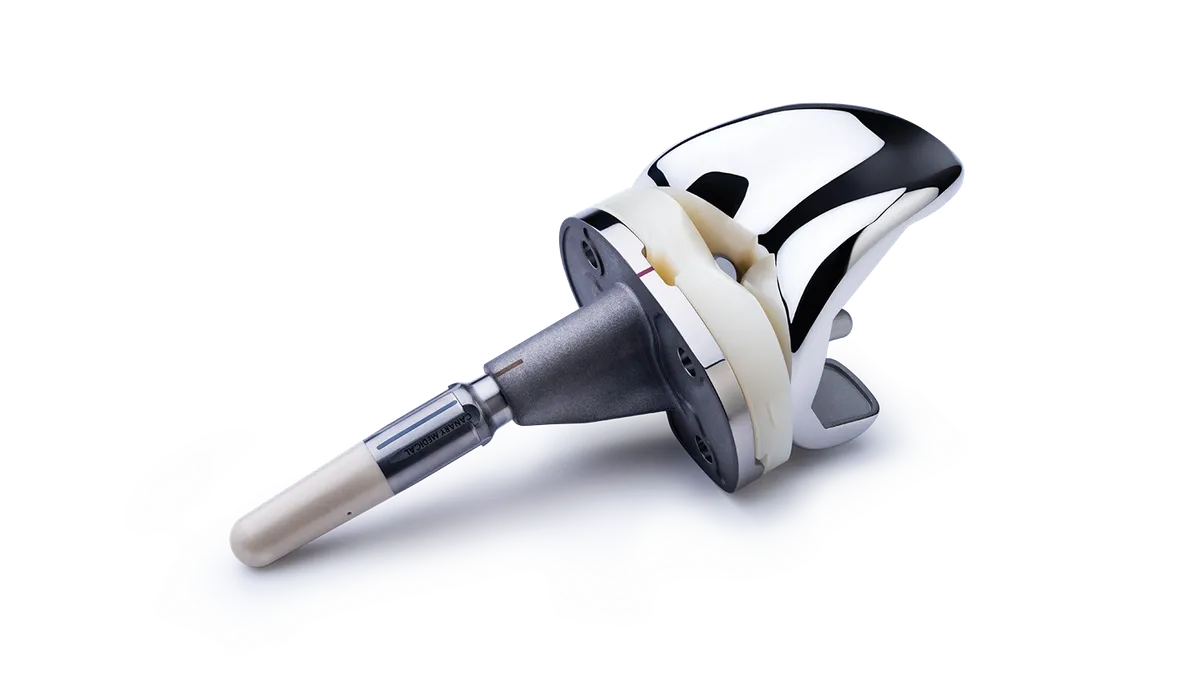Dive Brief:
- Ahead of Zimmer Biomet’s planned launch of its “smart knee” implants that feature an embedded sensor, the Centers for Medicare and Medicaid Services proposed a new technology add-on payment (NTAP) for the device.
- The CMS recommended an NTAP of $851 per knee, or $1,702 for two knees, in its Inpatient Prospective Payment System Proposed Rule for fiscal year 2024.
- The proposal should allow Zimmer Biomet “to not only drive technology adoption once a full launch begins but also help justify the premium that ZBH plans to charge for the device's added capability,” RBC Capital Markets analyst Shagun Singh wrote.
Dive Insight:
Zimmer Biomet received De Novo clearance for its Persona IQ smart knee in 2021. The device includes a cemented knee implant and a sensor made by Canary Medical, which is embedded in a tibial extension and tracks data on a person’s gait, range of motion and step count.
The companies plan to begin a full launch of the product once enough data are accumulated from the devices that have been implanted, which is expected in 2024, Singh wrote in a research note on Tuesday.
The CMS uses NTAP to cover costly new technologies that are not included in diagnosis-related group bundled payments. If approved, the payments are in effect for no more than three years. Zimmer Biomet submitted an NTAP application for the Canary tibial extension on its Persona IQ implant last year.
The company found that the average charge per case for a cemented knee replacement was $90,599. According to the CMS, the total cost to hospitals for Canary’s tibial extension was $1,654 per knee, including $1,309 for the extension itself and $345 for a base station used to query the smart implant while the patient is asleep.
CMS would finalize the decision in late summer, and the NTAP would become effective on October 1, 2023, Zimmer Biomet wrote in an email.
"We are working towards scaling the launch this year while also actively working with Canary on the next set of critical product launches," the company added.
Singh wrote that the final rule is likely to pass, given that the device meets the CMS’s criteria for cost and newness to be eligible for NTAP payments. However, the smart implant has also gotten a mixed reception from physicians, based on comments RBC Capital Markets received at its 2023 Medical Device Doctor Days event.
One physician said he doesn’t see the benefit of the implants yet and that adoption would depend on cost and utility. Another said there isn’t yet an established baseline to measure success with the implant, Singh wrote.
The analyst suggested that some of the feedback is due to the fact that the device is still early on the market and in a limited launch.
Zimmer Biomet rival Stryker is still in the process of assessing the utility of smart implants before it decides whether to make a significant investment in the field, according to conversations with CEO Kevin Lobo, Singh added.
This article has been updated with comments from Zimmer Biomet.













